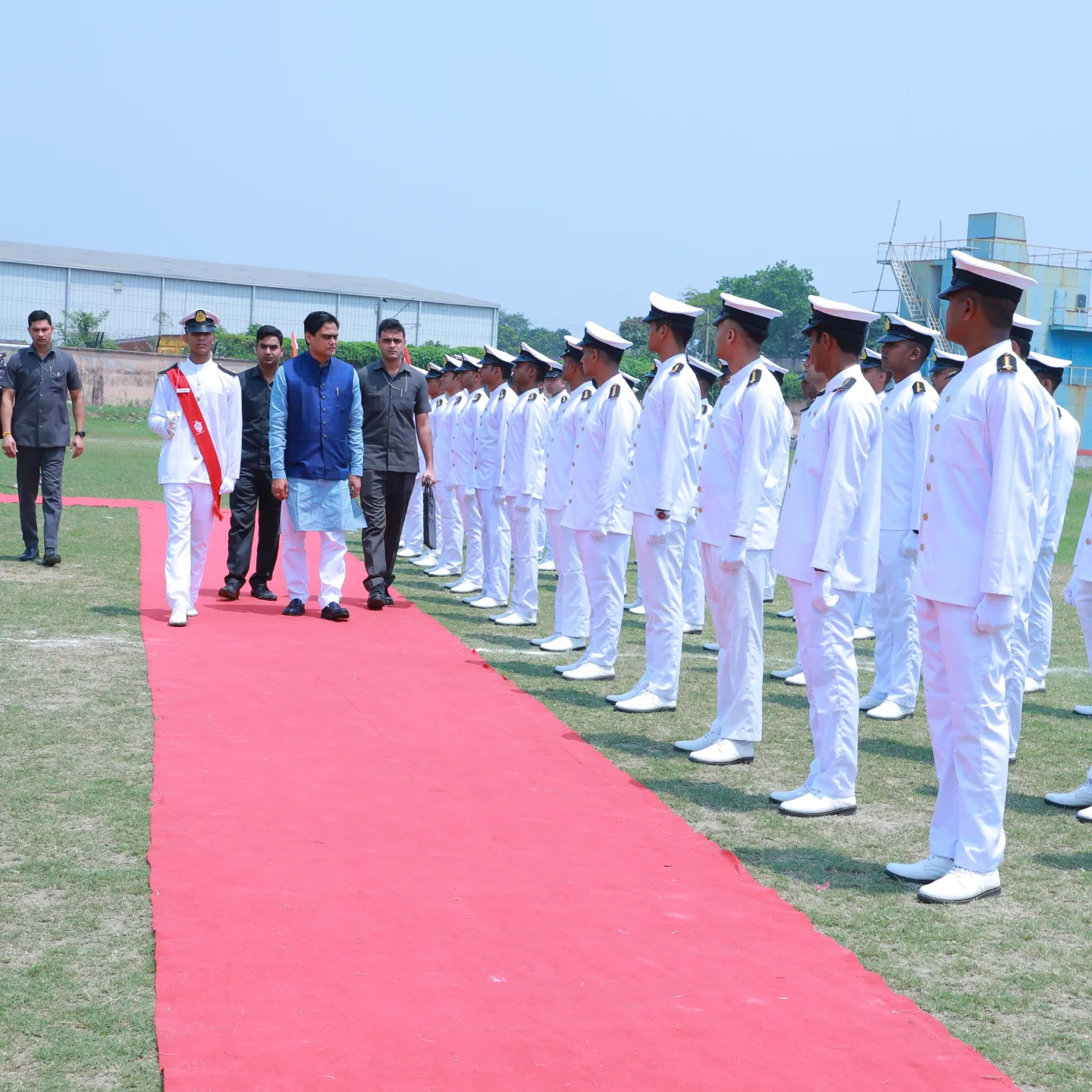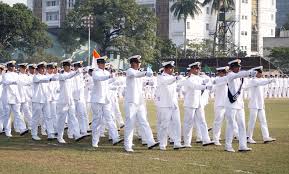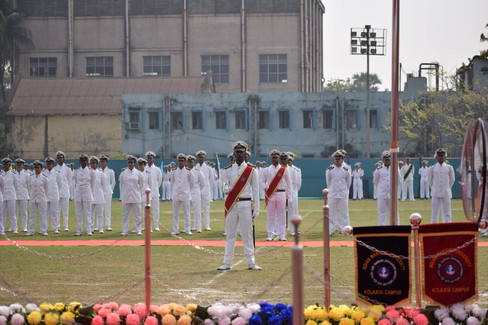DMET Diaries: A White Tunic, Buckskin Shoes, and an Ocean of Memories
- Satti Arora

- Mar 21, 2025
- 8 min read

Standing at the Parade Ground Again: I find myself back on the parade ground, 59 years since my own Passing Out Parade. The sight of fresh-faced cadets in immaculate whites immediately transports me to a different era. In my mind’s eye, it is 1966 once more – a sunny afternoon in Kolkata – and I am a young cadet wearing a crisp white tunic and buckskin shoes, heart pounding with pride and anticipation.
The band plays a familiar march, and as the cadets today stand at attention, I feel the same thrill I did decades ago.
How swiftly time has flown! The parade ground that once echoed with our youthful voices now resonates with theirs, yet the spirit remains unchanged.
Echoes of 1966: The Day We Passed Out
I still remember every detail of that day in 1966. The morning of our Passing Out Parade, we woke before dawn, nerves and excitement entwined. We donned our ceremonial uniform with almost sacred reverence – the white tunic pressed to perfection, the buckskin shoes polished until they gleamed. That uniform wasn’t just cloth and leather; it was a symbol of the discipline and pride instilled in us through four rigorous years of training. Standing tall with my fellow cadets, I felt a surge of accomplishment.
We were no longer trainees; we were about to become full-fledged Marine Engineers, ready to sail the world’s oceans. Our instructors watched with proud, misty eyes as we marched past in synchrony, each step stamping our place in the long lineage of DMET. In that moment, under the saluting dais, with the Governor looking on, I knew my life had changed forever.
I had earned the right to call myself a Marine Engineer – a moment of pure pride and joy that still warms my heart today.
Traditions in White: The Tunic and Buckskin Shoes
One tradition stands out vividly in these memories: the white tunic and buckskin shoes. For generations, this was the hallmark of DMET’s Passing Out Parade attire. The stark white uniform set us apart – it symbolized purity of purpose, and the buckskin shoes (those famously stubborn white suede shoes we lovingly chalked and polished) taught us that every detail matters. When I see old photographs of us in that uniform, a lump forms in my throat. We wore it not just for show, but as a legacy. The white tunic had been worn by those before us and would be worn by those after – linking each passing out class in an unbroken chain of tradition. It represented the discipline, pride, and legacy that DMET ingrained in its cadets.
This year, I learned that at the latest Passing Out Parade, the academy discontinued the tunic and buckskin shoes for the first time. I must admit, it felt like a piece of my heart broke upon hearing that. I understand times change and uniforms evolve, but I believe some traditions are worth preserving. The tunic and buckskins were more than uniform to us – they were a rite of passage. In them, we stood a little taller, walked a little straighter.
They reminded us that we were part of something larger, a history and brotherhood that preceded and would outlast us. I hope the powers that be reconsider, for those white uniforms embody our discipline, pride, and the legacy we cherish. In letting them go, we risk severing a tactile link to the past.
As an old sailor who’s seen the world, my conviction is that progress should never come at the cost of heritage. The cadets of today deserve to feel the same magic of that white tunic swishing around their knees and those buckskins snug on their feet – the very feeling that made us know we had arrived as officers.
Brotherhood of the DMETians
Beyond the uniform, what truly made our journey special was the unbreakable bond among us DMETians. The Class of 1966 started as a collection of teenagers from different corners of India, but by the time we marched in that parade, we were brothers. Together we had braved the intense coursework, long days in the workshops and engine rooms, endless drills on the ground, and even the occasional mischievous escapade after lights-out. Those shared struggles forged a camaraderie that time and distance could never erode.
Even now, decades later, I can close my eyes and hear the laughter in our dormitories, the friendly jibes in the mess hall, and the late-night discussions about our future sailing adventures. We addressed each other not by rank or title, but as DMETians first. This fraternity of marine engineers is a treasure I carry in my heart. We celebrated each other’s successes and stood together in hardships.
When one of us was homesick or troubled, the rest became his family. When we earned our engine cadet stripes, we did so together, arm in arm, sharing in each triumph. Such was the brotherhood that even after graduating, whenever our ships docked in the same port, we’d hunt each other down for an impromptu reunion, picking up right where we left off.
Seeing Myself in Today’s Cadets
Standing on the sidelines of today’s Passing Out Parade, I watch the young cadets and my eyes well up. In their confident strides and beaming faces, I see myself. It’s as if time folded back and my 22-year-old self is out there marching in step with them. The cadet captain barks a command and I see a flicker of nerves in a young man’s eyes – a flicker I know too well. I recall how I felt wearing those heavy epaulets for the first time, leading my platoon, praying I wouldn’t mess up. Today’s cadets carry that same mix of anxiety and excitement, and it’s beautiful to witness.
As they line up for the final salute, memories flood my mind. I remember standing in that exact formation, squinting in the bright afternoon light, searching the crowd for familiar faces – just as I see some of these cadets doing now. Perhaps they too spot their proud parents or mentors, and stand a little straighter. When the band strikes up the notes of the farewell song, I notice a few chins trembling ever so slightly. I smile knowingly – at 22, I fought back tears too, overwhelmed by the enormity of the moment.
These young men and women may be strangers to me, but in that instance I know them intimately. Their journey is the one we walked, their pride is ours, and their future is the continuation of our story. I cheer and clap as if each one were my own son or daughter, because in spirit they are my juniors, my extended DMET family.
A Nostalgic Video of Passing Out Parade (Courtesy: Rajat Kaushik, Class of 20023)
Honouring Absent Friends and the Passage of Time
Not all my batchmates lived to see this day. As the cadets march past the reviewing stand, I feel a bitter sweet tug at my heart. I quietly whisper the names of dear friends from the Class of ’66 who have long since sailed on to calmer seas. Many of my brothers have answered the final muster over the years. Some were lost far too young – a tragic engine room accident at sea, an illness that took one too soon, others simply the toll of time on aging bodies.
Each year, our reunion group grows a little smaller, and the toasts we raise are as much to the departed as to the living. Mortality is an inevitability, something we joked about in youth but now reckon with in our twilight years.
I feel their presence strongly today. I imagine them standing alongside me – Adarsh with his infectious grin, Ashok Jain with tears glistening in his eyes (he was always the emotional one), Rani, as fondly called, standing ramrod straight as if on parade. I know if they were here, they’d be just as proud and misty-eyed as I am, applauding these cadets. In the cadets’ youthful faces, our departed friends live again. Their legacy endures in every salute, every cheer of “Hip Hip Hurray” that closes the ceremony. We DMETians often say that no one truly ever leaves the fraternity – and I believe it. Our batch may have lost many, but we gained innumerable brothers in the batches that followed.
In this continuity, there is a kind of immortality. As long as DMET stands and cadets march out to sea, a part of each of us endures in them.
A Legacy Carried Forward
Our alma mater, DMET (now IMU Kolkata), was established way back in 1949 with a mission to train India’s finest marine engineers.
We were acutely aware, even as cadets, of the legacy we were inheriting. The walls of our classrooms were adorned with black-and-white photographs of earlier classes, and every time we walked past those, we straightened our backs, knowing we had big shoes to fill. The institute’s very motto, “Samudra Gyanam, Gyana Samudram,” translates roughly to “The knowledge of the ocean is an ocean of knowledge,” a guiding wisdom we carried with us in our careers
We lived by that creed – embracing lifelong learning and humility before the vast sea.
Today, watching the new graduates, I am filled with hope that they too will carry forward the torch. The world and the shipping industry have changed unimaginably since our time – from steam engines to automated engine rooms, from paper charts to GPS. But the core values we learned at DMET are timeless. Honor, discipline, knowledge, and brotherhood – these are as important on a modern LNG tanker as they were on the old steamers we sailed.
I see those values reflected in the smart turn-out of the cadets, in the confident way they salute their superiors and embrace their comrades. They are ready to embark on voyages across the globe, just as we did. And wherever they go – be it stormy seas or calm harbors – a piece of DMET goes with them.
Forever Part of the DMET Brotherhood
[41†embed_image] As the sun sets behind the parade ground, casting long golden rays over the assembled officers and guests, I stand a while longer, reluctant to leave this place that feels like home. In the twilight, I close my eyes and imagine the sea – endless and eternal – the same sea that has been our livelihood, our teacher, and sometimes our foe. I picture myself one day, not too far in the future, as a silent watcher from beyond the horizon.
Perhaps I will take my final voyage and become one with the sea breeze that tousles the cadets’ hair on parade. I like to think that even after I am gone, I will always be here in spirit – a white-tunicked figure standing at the back, smiling proudly as each new batch marches out.
In that poetic vision, I am on the bridge of a ship sailing into a sunset, but my eyes are turned shoreward, toward DMET. Beside me are the ghosts of my batchmates, all of us young and strong as we were in 1966, all dressed in our finest whites. We salute in unison as the next generation steps into the world. The ocean reflects the sky in hues of orange and gold, and in the whisper of the waves I almost hear a marching tune and distant cheers. Our spirits watch over every Passing Out Parade – an unbroken lineage of mentors and well-wishers, forever a part of the DMET brotherhood.
As I leave the campus ground tonight, a gentle breeze carries the faint sound of laughter – or is it the echo of memories? I smile through my tears, heart full. We DMETians never really say goodbye. Our bodies may fade with time, but our legacy sails on in each new cadet. And whenever these young officers stand on deck under a starry sky, or face a gale in mid-ocean, we will be there with them. I am DMETian Satti Arora, DMET Class of 1966, and even 61 years later – in this life and beyond – I remain, forever a DMETian.
























